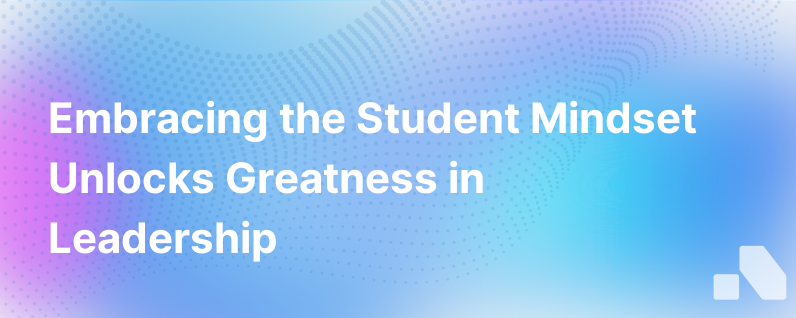Students Of The Game Great Ones
Published on November 21, 2023 by Sawyer Middeleer
In the crucible of competition and within the annals of championship history, the adage that hard work beats talent when talent fails to work hard resounds with a timeless echo. Beyond the raw athleticism, cognitive acuity, and serendipity that part the curtains for success in sports, business, or any performance art, lies an attribute both defining and often overshadowed: The appetite for continual learning. We call the possessors of such zealous curiosity "Students of the Game," and indeed, the greatest among us are always ravenous for knowledge, insight, and self-improvement.
The Essence of a True Student
In the realm of sports, legends like Michael Jordan, Mia Hamm, and Tom Brady are not only remembered for their victories and exceptional talent but also for their insatiable desire to learn and evolve every aspect of their game. It's this pursuit of greatness through the refinement of skill and intellect that separates the memorable from the immortal. The concept of being a 'student of the game' transcends the playing field, infiltrating the boardrooms of Fortune 500 companies, the workspaces of innovative startups, and the classrooms of prestigious institutions.
The correlation isn't merely metaphorical. It is anchored in the philosophy that the pursuit of knowledge, the flexibility to adapt, and the willingness to challenge one’s own paradigms are foundations upon which empires of success are built.
The Traits of Great Students in the Game of Life
1. Unending Curiosity: The great ones don’t just want to know 'what' or 'how' but 'why.' They dissect successes and scrutinize failures, seeking the lessons cloaked within each experience.
2. Continuous Learning: For these individuals, there is no finality to their education. They consume books, videos, articles, and engage in discussions—anything that helps them to gain a new skill, concept, or perspective.
3. Humility to Acknowledge Ignorance: True students understand that acknowledging a gap in knowledge is the first step toward filling it. They are not embarrassed by their questions, no matter how fundamental they may seem.
4. Analytical Ability: To learn effectively, one must identify patterns, break down complex concepts and apply logical thinking. This also enables them to predict outcomes and adapt strategies accordingly.
5. Emotional Intelligence: Decoding the human element—understanding team dynamics, reading an opponent, or intuiting the needs of a market—is as crucial as technical know-how.
6. Patience and Perseverance: Instant gratification is a myth they’ve debunked early on. They recognize that mastery is a journey of countless incremental advances.
7. Constructive Application of Knowledge: It's not enough to stockpile information. The great ones apply what they've learned, crafting innovative strategies and techniques.
8. Reflective Practice: They are voracious in their reflection, understanding that the compounding effect of small, daily improvements leads to quantum leaps over time.
Real-World Examples
In Business: Consider the visionary leaders like Elon Musk or Satya Nadella. These figures remain students despite their monumental success. Their daily habits include extensive reading and learning from the operational layers of their enterprise.
In Academia: Nobel laureates—students at heart—put forward hypotheses, often derived from the works of their predecessors, to construct new theories and breakthroughs.
In Everyday Life: Even outside the spotlight, professionals across fields who subscribe to lifelong learning often rise to paramount success. They are the CEOs who started at the mailroom, the community leaders shaping generations, and the educators who invest their lives in the continuous cycle of teaching and learning.
Applying the Wisdom of Great Students to Personal and Professional Growth
To embody the spirit of an eternal student is to grant oneself permission to fail, learn and evolve. Individual growth mirrors the iterative processes found in the sciences—hypothesize, experiment, review, adjust, repeat. Here's how to nurture the student mindset:
- Seek Feedback - Constructive criticism not only highlights blind spots but can corroborate successes.
- Engage in Deliberate Practice - Target skills and competencies for improvement, focus intensely, seek feedback, and refine your approach.
- Cultivate a Diverse Network - Interdisciplinary insights can trigger breakthroughs. Cultivating relationships across different fields can catalyze unexpected synergies.
The Takeaway
The great ones—the Michael Jordans and Marie Curies—did not achieve their status by talent alone, nor did they ever rest upon it. They were students first—passionate, diligent, curious seekers of truth and excellence in their respective games.
Being a perpetual student of the game isn't merely a quest for knowledge in a traditional sense. It is a holistic commitment to the understanding and application of life's ever-evolving lessons. It demands the courage to forge ahead when the path disappears, the wisdom to lead when guidance is scarce, and the vision to see the apex when the summit is beyond the clouds.
In conclusion, the beacon of success is lit by the flame of eternal learning. The students of the game, who apply themselves unrelentingly, are the very ones who redefine the boundaries of what is possible and become the great ones we revere.
As we absorb these lessons in our pursuits, may we, too, embrace the heart of a student and the dedication of a master, carving our paths with the confidence of those who play the long game – for such is the approach of champions.